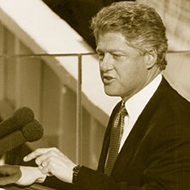A New Presidency
Clinton was in many respects the perfect leader for a party divided between liberal and moderate wings. He tried to assume the image of a pragmatic centrist who could moderate the demands of various Democratic Party interest groups without alienating them.

President William (Bill) J. Clinton, delivering his inaugural address to the nation, January 21, 1993. During his administration, the United States enjoyed more peace and economic well-being than at any time in its history. He was the second U.S. president to be impeached and found not guilty.
(Dwight Somers)
Avoiding ideological rhetoric that declared big government to be a positive good, he proposed a number of programs that earned him the label "New Democrat." Control of the federal bureaucracy and judicial appointments provided one means of satisfying political claims of organized labor and civil rights groups. On the ever-controversial abortion issue, Clinton supported the Roe v. Wade decision, but also declared that abortion should be "safe, legal, and rare."
President Clinton's closest collaborator was his wife, Hillary Rodham Clinton. In the campaign, he had quipped that those who voted for him "got two for the price of one." She supported her husband against accusations about his personal life.
As energetic and as activist as her husband, Ms. Clinton assumed a more prominent role in the administration than any first lady before her, even Eleanor Roosevelt. Her first important assignment would be to develop a national health program. In 2000, with her husband's administration coming to a close, she would be elected a U.S. senator from New York.
